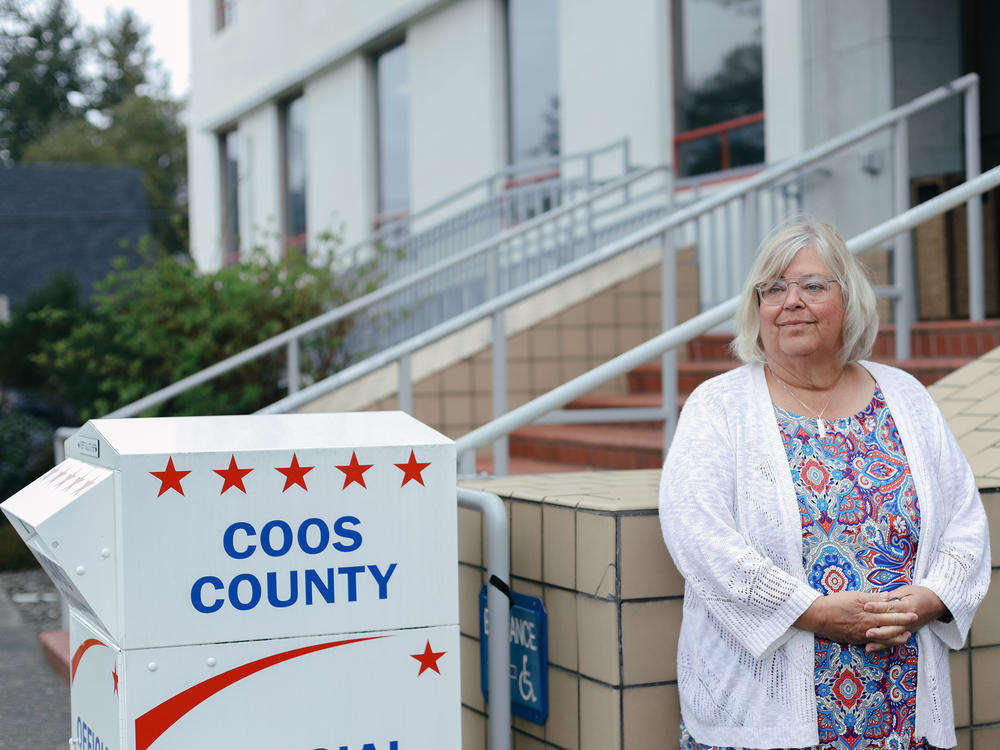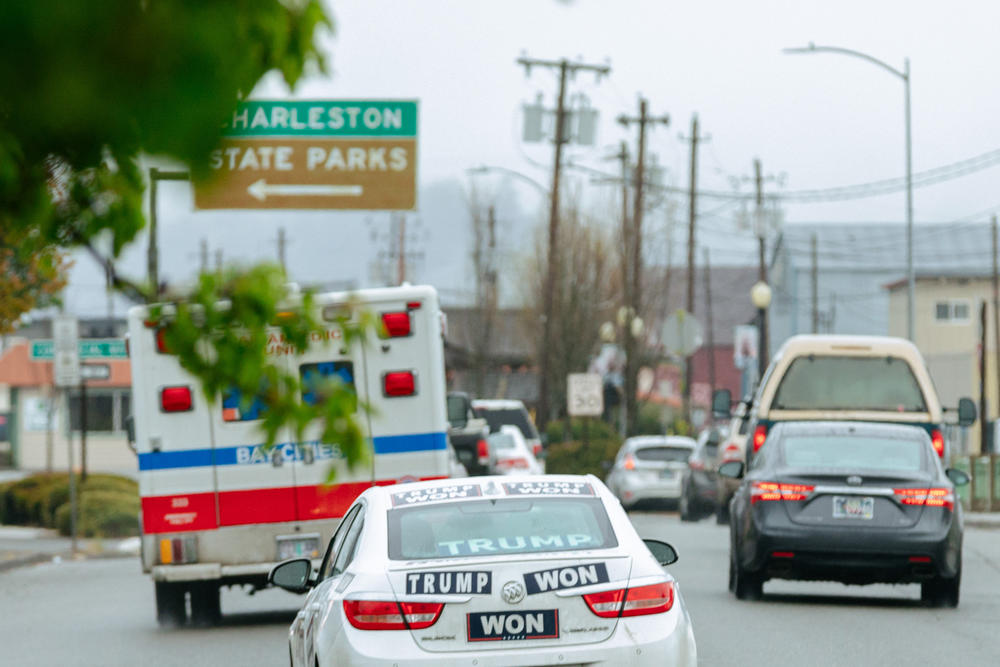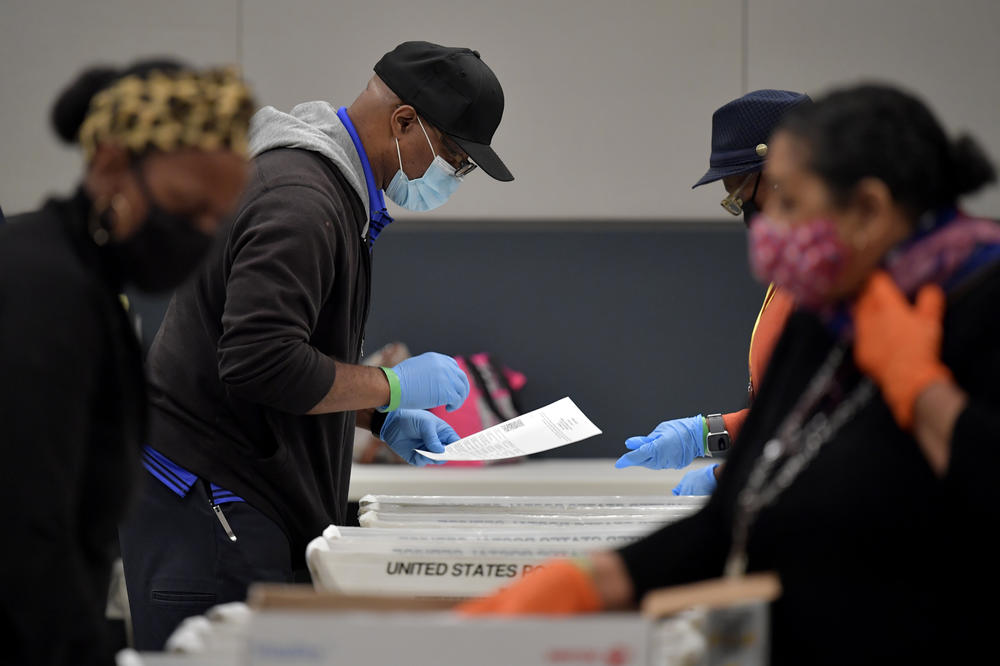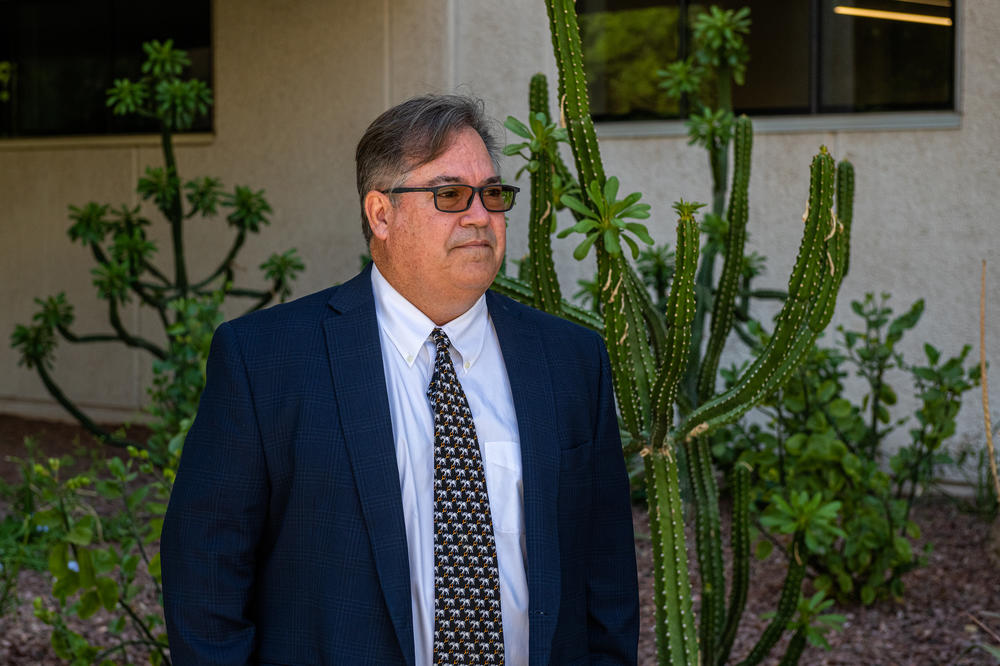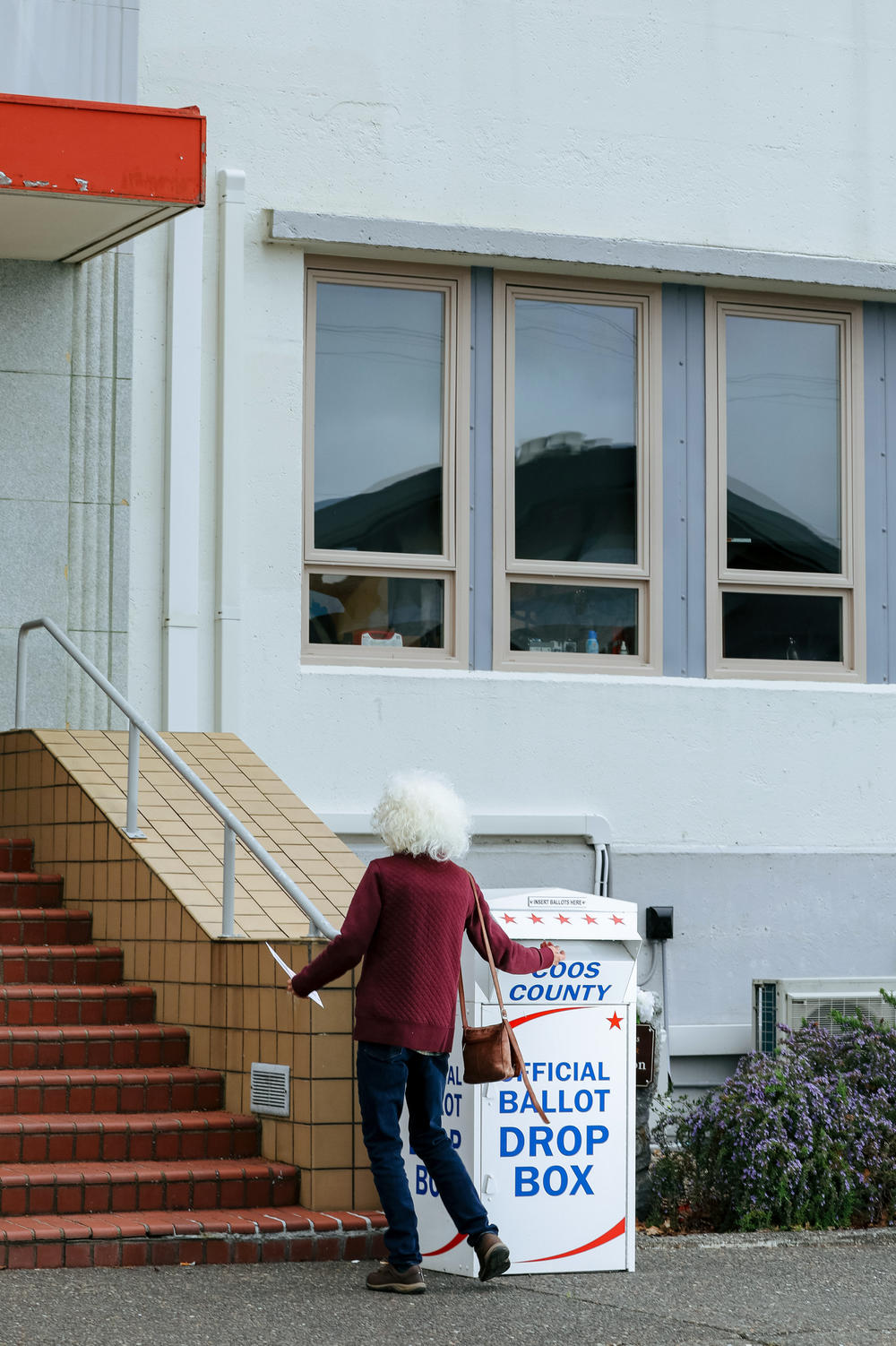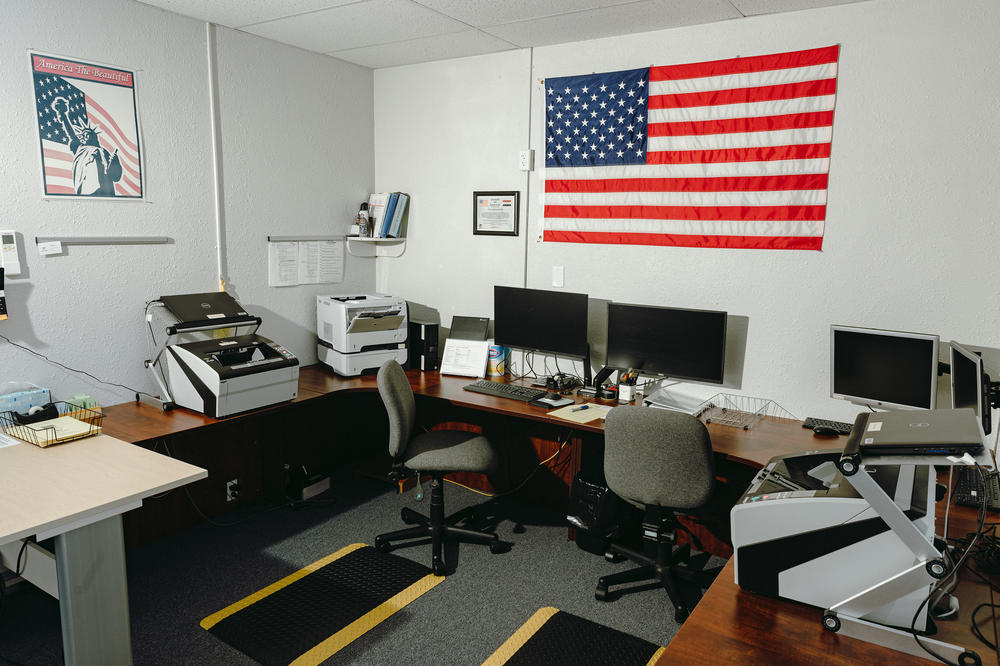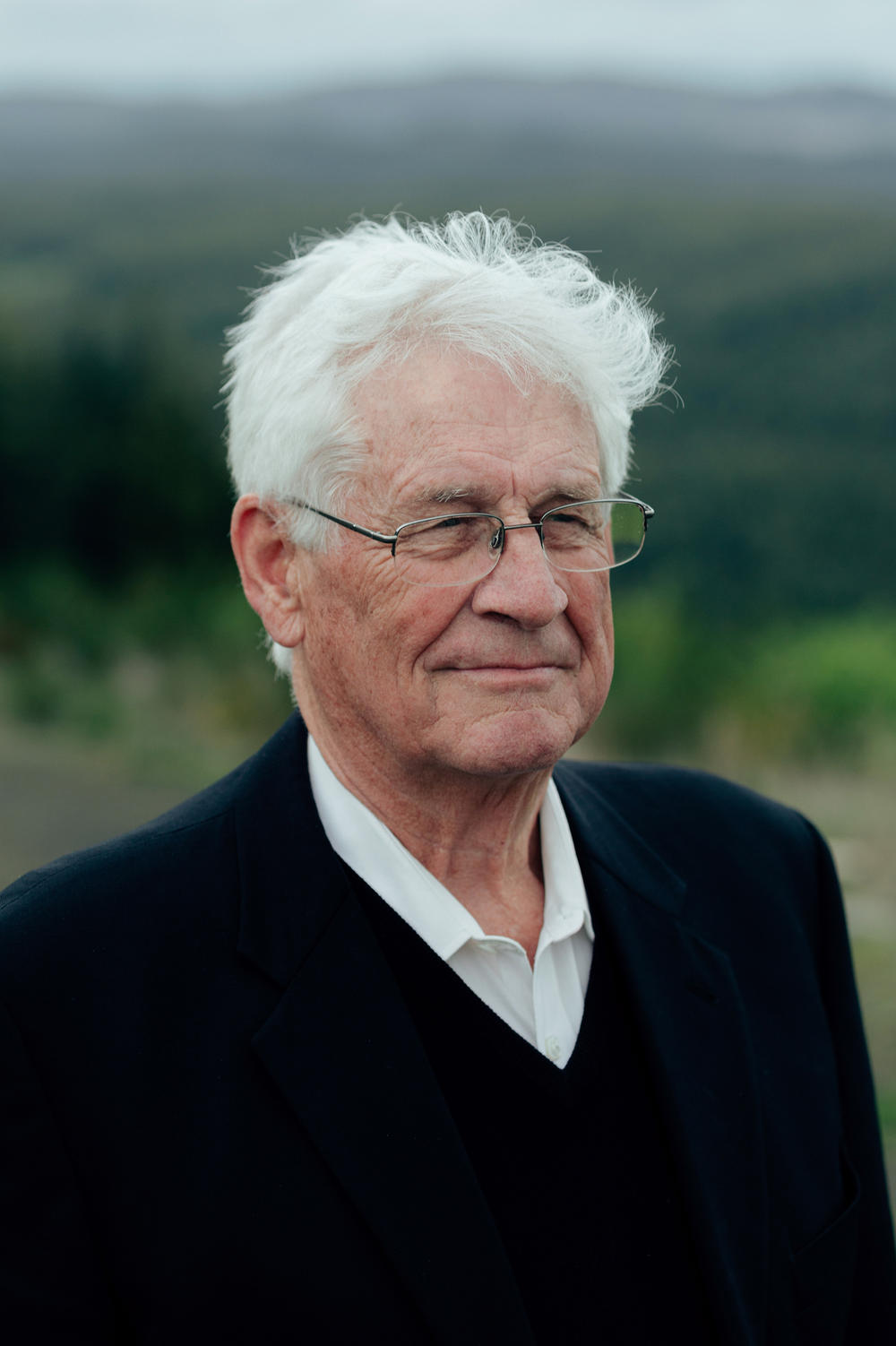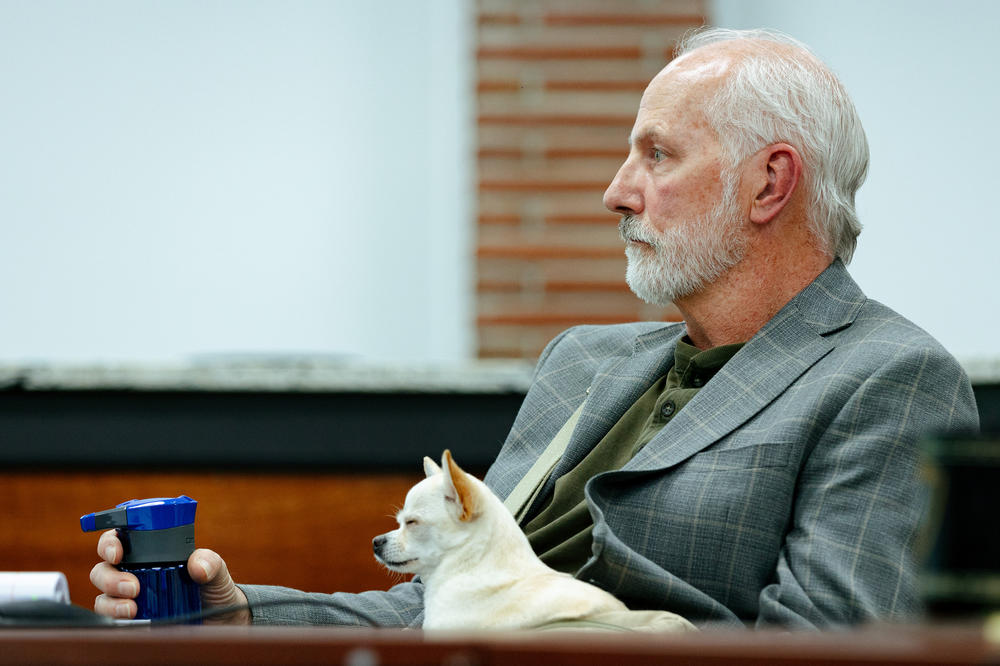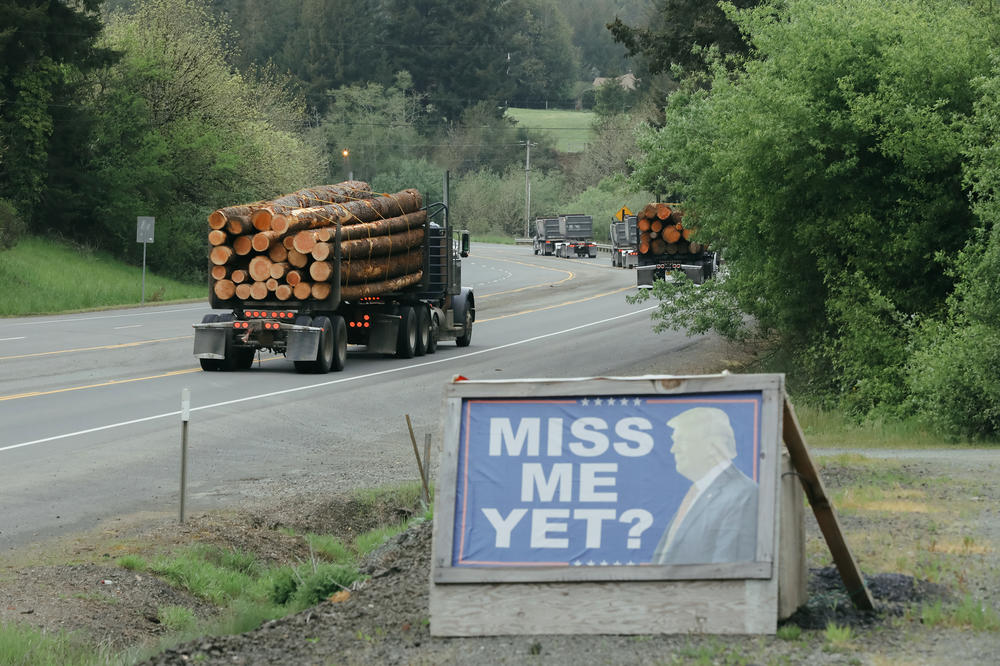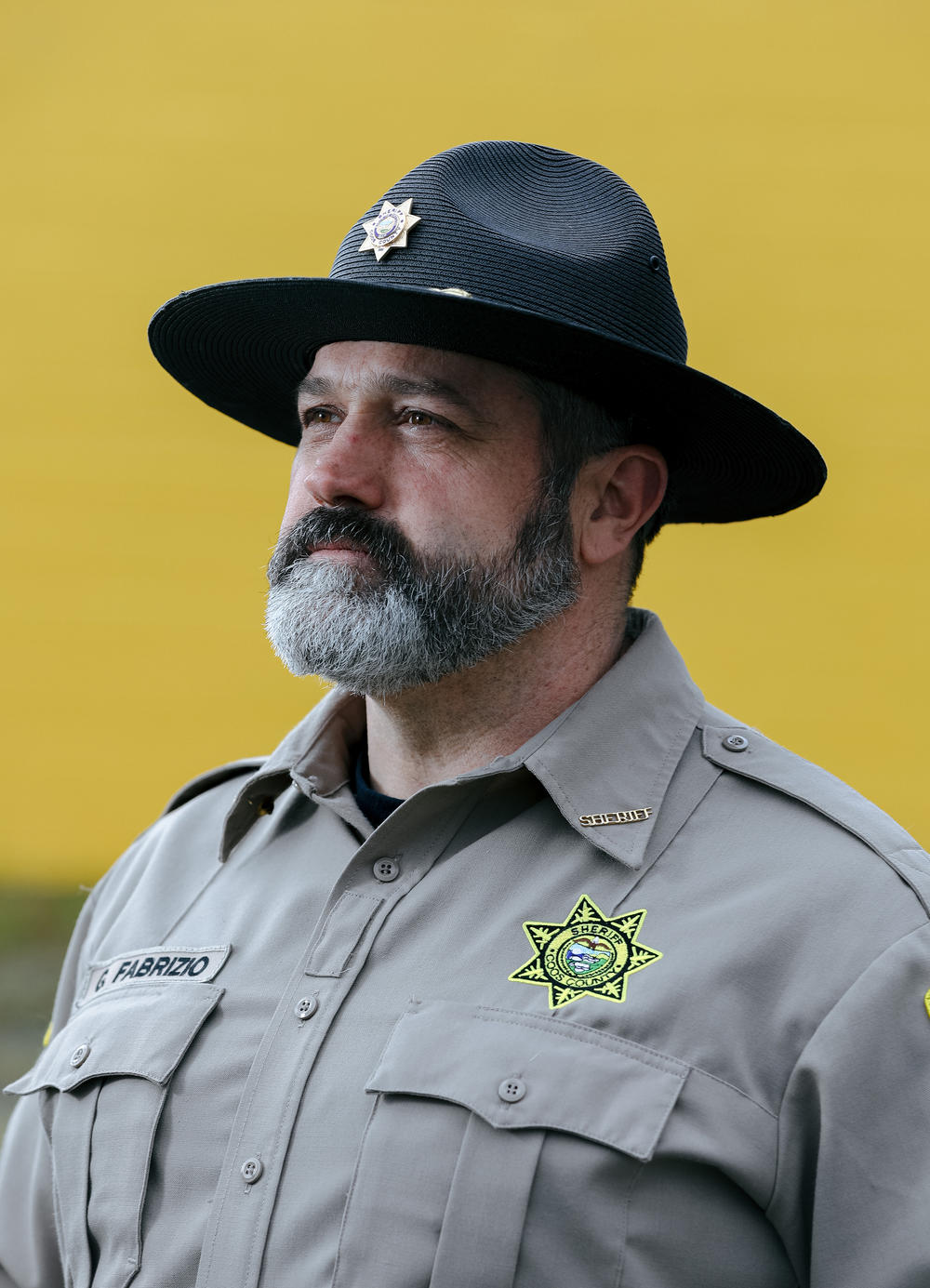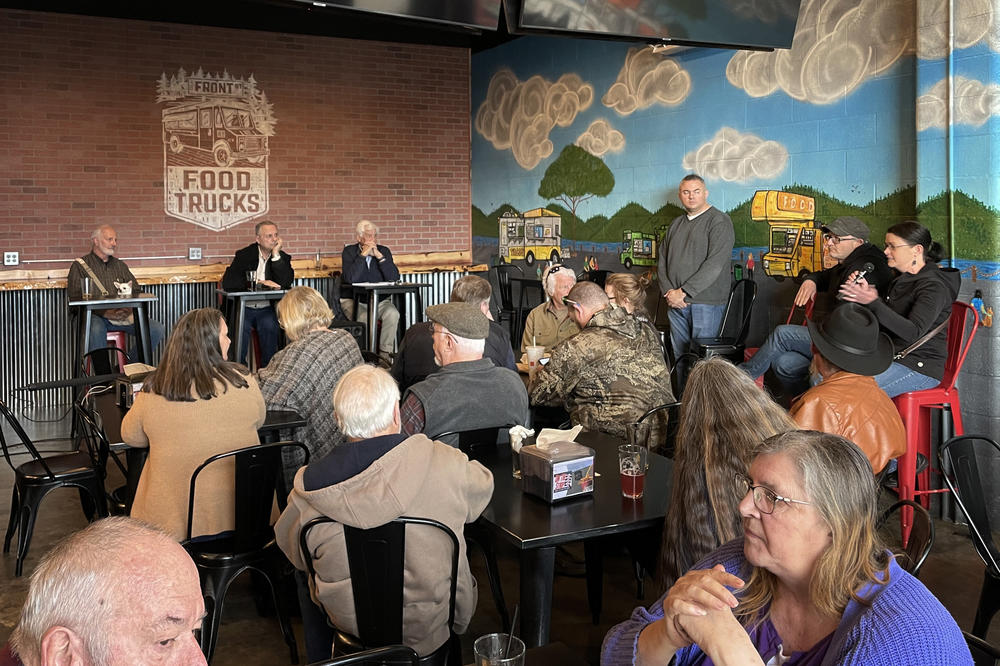Section Branding
Header Content
Death threats, harassment and a poisoned dog: 2024 election workers already are scared
Primary Content
The county election worker was crossing the street with a locked bag full of ballots when he saw a Jeep Gladiator pickup truck come around the corner. It sped toward him and slammed on the brakes, skidding to a stop just past him. The driver glared.
"Then she leaned out of the car and looked at me and yelled, 'you f***ing traitor!'" he said.
The woman had been following him all day as he drove around collecting ballots from drop-boxes in Coos County, Ore. The man — whom we've agreed not to identify because he said he fears being further targeted — says she would get out and film him, and that she had a gun on her hip.
Things weren't much better over at the county elections office. Local people, apparently juiced up on misinformation related to Donald Trump's false claims about rigged elections, were camped in the hallway day after day.
"Some of them were very mean," says Dede Murphy, the county clerk during this past midterm election. One called her "a wicked woman." Another barked through a bullhorn, "you should be ashamed of yourself."
Even though Trump won 59% of the vote in this county in 2020, Murphy and the other election workers say two years later people were still yelling in their faces about voter fraud.
Some of it seemed ridiculous, but other times it was scary.
Officials set up metal detectors at the entrance to the building, and over about a month, a security guard stopped people from bringing in a total of 20 guns and 60 knives or other weapons.
The worker collecting ballots called 911 four times the day he says he was menaced by the woman in the Jeep.
"I have had somebody following me," he tells a police dispatcher in one call. "She tried to run me off the road."
The roads in this rural Oregon county wind through steep wooded hillsides, logging trucks hurtle past in the other direction. He says the woman tailgated on his bumper, driving erratically, sometimes swerving into the oncoming traffic lane next to him.
"I was terrified," he says. "I was worried that I might not make it off that road."
As the country heads into the next election, NPR obtained contact information for thousands of local election workers and reached out to them. Workers and officials across 22 different states responded and told NPR they've received threats, felt unsafe doing their jobs, feared for the safety of their families, or even their pets.
Their stories show that more than two years after the riot at the U.S. Capitol on Jan. 6, 2021, not only is Trump's lie that he won the election alive and well in a large chunk of the Republican Party, but the misinformation about voter fraud is endangering the people whose job it is to conduct elections.
"I actually bring a weapon with me every day to work," says Nancy Boren, the director of elections in Columbus, Ga. "We also have security here at this building who, it sounds even crazy to say this, but, walks me to and from my car."
NPR spoke to many election workers who didn't want to use their names for fear of further harassment or threats.
"We have a lot of, you know, just general 'f*** you's, you're trying to rig the election... you oughta be ashamed of yourself,'" says one worker in Georgia.
"They said that they were coming for my family and somebody would have to pay for this," says an official in Virginia.
A looming sense of menace
When threats are made, often they're vague and just add to a looming sense of menace. But sometimes they're more direct.
"The threat was very specific with my name and my home address, and that I had four children and that all four of my children should be killed," says Thomas Liddy, an official with Maricopa County in Arizona who was threatened this past November. The FBI tracked down and arrested the person, who pleaded guilty to a criminal charge and is awaiting a sentence of up to five years in prison and a $250,000 fine.
Another official in a southern state tells NPR she too was targeted during last year's midterms. "The threat was specifically that the following week I would not be alive, my home address was made public online, and then my dog was poisoned." The official says the dog survived, barely.
There is no evidence of widespread voter fraud. Following the 2020 election, more than 60 lawsuits brought by Trump and his allies were all thrown out of court.
The election officials being targeted say they're just trying to do their jobs. They're Republicans, Democrats and independents — everyone from top state officials to lower-level county workers who handle ballots or even senior citizen volunteers.
2024 could be worse
"Election officials have been under siege," says David Becker, executive director of the nonprofit Center for Election Innovation and Research. "They've been threatened, abused and harassed for nearly three years now and it's getting worse."
The Department of Homeland Security issued a bulletin in May warning that perceptions of the next presidential race could mobilize individuals to commit violence.
Many election officials say they need more resources to pay for better security and to do outreach to fight misinformation. Some election workers tell NPR they are scared by the threats and harassment and consider quitting their jobs. Others say it hardens their resolve to do the important work of running free and fair elections.
Other recent research backs up what NPR found. A survey from the nonprofit Brennan Center found nearly one in three election workers say they've had to deal with harassment, abuse or threats. And almost half worry about the safety of their colleagues in future elections.
"I am very nervous about next year... the presidential year," says one of the election workers in Coos County. She and her husband, the worker who says he was chased in his car, both work in the local elections office. And they've been dealing with all this while having their first baby. She was nine months pregnant this past midterm election.
"During that time I was scared every time I came into work, being at work, leaving," she says. "And I didn't get to feel safe at home either."
She says the couple was followed home from work. People knocked on their neighbors' doors asking questions about them. They even went through the couple's garbage.
It was a relentless mix of ridiculousness along with things that were more frightening, such as violent-sounding posts on social media, election workers told NPR.
Like others NPR talked to, the couple set up a motion-sensitive flood light and a security camera. And the couple doesn't think the community there in Coos County realizes what they've been going through at the elections office.
Mob mentality
"It felt like we were under attack," the woman says. "Constant phone calls and people coming in and making accusations and yelling at us. ... It felt very much like they were just harassing us, like they were just there to intimidate us."
During her NPR interview, she broke down crying while describing one moment during the midterm election when the sheriff was escorting her past the people camped out in the hallway.
"As the sheriff was leading us outside, people were recording and laughing like, 'that's so funny' that we're so scared that we had to have the sheriff walk us out." She says it was just bafflingly hurtful to be treated that way. "That was just really crazy."
"Absolutely inexcusable that that would happen," says 83-year-old Coos County Commissioner John Sweet. He's a Republican who does not believe in voter fraud conspiracy theories embraced by many in his party. He says it was hard to watch and hear about local people doing all this to county election workers.
"It's a form of ... mob activity," Sweet says. "The mob takes on a personality of its own that's probably different than the prevalent personality of the individual members of the mob."
Sweet says he doesn't think it was unique to his county this past midterm election. "It was a national thing."
Of course the mob at the Capitol building was a highly visible spectacle that's seared into the memories of many Americans.
But when NPR looked around the country it found that people with the same motivations were taking up the fight but in less-visible ways.
And that's happening in Coos County.
Election deniers run for local office
Rod Taylor runs a local surveying supply business and was arrested for a curfew violation on Jan. 6, 2021, in Washington, D.C.
"I heeded an admonition from General Michael Flynn to go home and make a difference there," Taylor tells NPR. "So we started a citizens group here in Coos County called Citizens Restoring Liberty and we continue to meet weekly."
The group is worried about supposed voter fraud as well as government regulation of guns, masks, and public schools. Some of its members have run as candidates for local government and school boards. Taylor himself ran for county commissioner.
"You know what, I'm proud to have been there on Jan. 6," Taylor said on a local conservative talk radio show on Oct. 31, 2022, before the midterm election. "It was a peaceable gathering on the 6th ... people were happy, man."
Jan. 6 was, of course, quite violent. Taylor said on the talk show that he went into the Capitol building very briefly, although he says he didn't participate in the violence. He has not faced federal charges related to Jan. 6th.
County officials say members of that Citizens Restoring Liberty group were camped in the hallways of the elections office.
But, despite their concerns about voter fraud, when the votes were counted, Rod Taylor narrowly won — a result he does not dispute. And he is now a Coos County commissioner.
NPR interviewed Taylor at his new county office. He was wearing a gun on his belt, had a Scripture reading of the day on his desk, an American flag and a "Trump Won" sign.
Taylor mentions going to see people who tour the country promoting voter fraud conspiracy theories.
"I believe that there is a vast body of credible evidence ... that the 2020 election was in fact won by Donald Trump and that it was surreptitiously stolen," Taylor says.
In reality, there is no credible evidence of that. In addition to the dozens of lawsuits dismissed for lack of evidence nationally, a suit making vague allegations of voter fraud in Coos County was likewise thrown out by a judge.
NPR asked Taylor if he realized that local election workers in his own county feel threatened and harassed.
"Yeah, of course I'm aware of that," Taylor said. But when asked about whether he feels responsible for getting people stirred up to the point where election workers fear for their safety, he said, "I don't feel responsible for that."
"When you've got a large group of people, it's sometimes like herding cats and you cannot control what individuals do," Taylor said. "Unfortunately, we did have some people who I think engaged election staff in unproductive ways that I would not have advocated for and I still don't condone and that's unfortunate."
Julie Brecke, the new county clerk at the elections office, says she's trying to figure out how to avoid a repeat of last year in the upcoming presidential race.
"My biggest worry is that people aren't going to want to do the job anymore," she says.
Already one election worker has resigned.
"It's an important job and the people that work in this office take it very seriously," says Brecke. "If they're harassed constantly and made to look like villains, then eventually that weighs on people. I don't want to lose good people over harassment based on misinformation."
Threats, or freedom of speech?
For their part, law enforcement officials say it can be difficult to intervene. The election worker who says he was chased while collecting ballots says police told him there was nothing they could do, since no officers saw this person driving erratically.
The county sheriff's department says the incident was investigated, though apparently nothing resulted from that.
The sheriff, Gabe Fabrizio, says there were also complaints from voters who felt harassed or threatened at drop-boxes. But he says nothing rose to the level that law enforcement decided they could do much about.
"We want to make sure that everybody's First Amendment rights, their freedom of speech is protected," says Fabrizio. "So threats we take definitely seriously and we'll go investigate them ... but at the same time you have to balance that off of — people can say whatever they want."
Brecke, the county clerk, says she's been working with the sheriff to improve security of both the office and the election workers ahead of the upcoming presidential election. Election workers say they feel the sheriff is taking the situation seriously and are grateful for the help.
Around the country people are trying to find solutions. Election officials met last month in D.C., to share strategies. Some states are passing laws that, among other things, increase the penalties for threatening election workers while making their home addresses and other personal information private.
The U.S. Department of Justice has set up a special task force to investigate threats to election workers, and a spokesman tells NPR it has received reports of more than 2,000 incidents of hostility, harassment, abuse or threats. The DOJ says most don't meet the threshold of an unlawful threat of violence, but some do, and it has so far charged more than a dozen defendants. More cases are being prosecuted by state and local authorities.
For his part, John Sweet, the Coos County commissioner, thinks it will help that the local lawsuit over election fraud was dismissed as groundless, along with the fact that Fox News settled a defamation suit from Dominion Voting Systems over bogus claims of fraud for close to $800 million.
"I hope that has discredited some of the angst about election propriety," Sweet says. "I've experienced it already."
Sweet says he's heard from one of the people who he saw last year in the county building staring through the window to the elections office apparently trying to scare the workers.
"I think he was embarrassed about it," Sweet says. "He apologized — he said, 'I was out of line.'"
Still, the election workers say nobody has apologized to them.
And there was plenty of discord on display at a recent town hall meeting in Coos Bay.
"Transgenderism is a religion and it's attacking the public moral norm that we've had for 200 years," declared one concerned citizen in a Christian-themed T-shirt, amidst groans and head shaking from others in attendance.
Another resident stood up and asked commissioner Rod Taylor not to wear his gun around town. "Can you please carry your gun concealed," asked Dave Crane, "for people like me that would rather not look at it."
The former county clerk, Dede Murphy, had some words for Taylor too.
"I think that you and your group ... have made me a target," Murphy said. "You certainly have told a lot of lies about me and my office, that's for sure."
"I haven't told any lies about you," Taylor responded, speaking over Murphy. "In no way would I ever condone a threat against any person."
But at least one resident was looking for some common ground.
"I don't give a s*** who's wearing a dress and who's packing a gun," said De Dee Peterson. "What I want to see is this community thrive." Peterson said her family has lived in the county for five generations, and she doesn't like seeing her neighbors so divided.
"Even when we disagree, we can sit down in a room like this and talk about it, and not hate," Peterson said. "It's not team red versus team blue, we have to see through the middle."
This story was edited by Robert Little. It was produced by Meg Anderson. Photo editing by Emily Bogle and Virginia Lozano.
Copyright 2023 NPR. To see more, visit https://www.npr.org.
